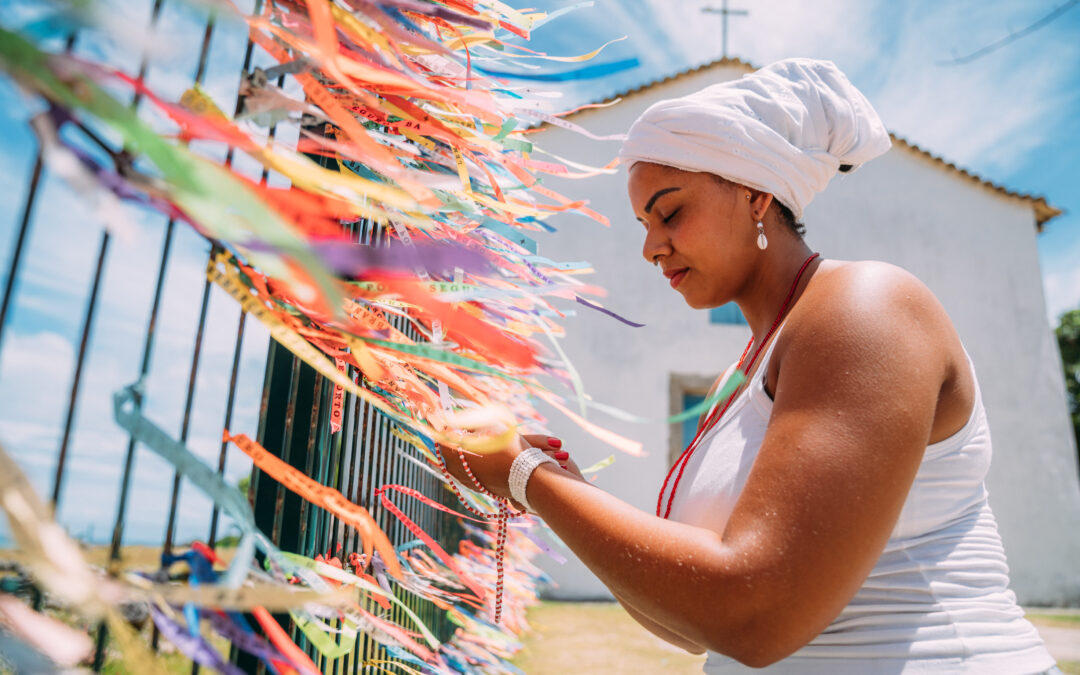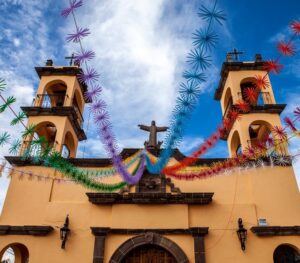By Manoela Carpenedo (University of Groningen)
Delineating an accurate religious map of Latin America and the Caribbean is a challenging task (Gutiérrez, 2015). The region reflects numerous global encounters that have only intensified the diversity of its previously existing religious configurations. At the same time, one cannot understand Latin American and Caribbean history without taking religion into account. Indeed, Virginia Garrard-Burnett, Paul Freston, and Stephen Dove (2016) have argued that it is useful to view the entire history of the region as a religious history.
Motivating the Iberian expansion in the New World, the alliance of ‘Cross and the Sword’ fuelled the colonial project (Oro & Ureta, 2007) and promoted the mass evangelisation of native and enslaved peoples to Catholicism. Indeed, the conquest of the New World by the Spanish and Portuguese can be defined as a ‘spiritual conquest’ in which colonisation was tied to the conversion to Catholicism. Latin American and Caribbean political history is therefore closely tied to the Catholic Church, whose authority was often more influential than the Crown itself during the colonial enterprise. Having a key socio-political role, Catholicism substantially contributed to the formation of nation-states, public administration and cultural identities across the region.
Characterised by an extraordinary capacity to accommodate existing cultures, the Catholic faith often syncretised with indigenous and Afro-Diasporic beliefs and practices through a myriad of bricolage processes. From educational provisions to potent symbols and images, the Church enforced not only a new faith, but also a symbolic system and worldview in the New World (Garrard-Burnett, Freston & Dove, 2016).
It was only when modernising Liberal waves promoted anti-Catholic sentiments in the nineteenth century that the hegemonic position of the Church started to diminish. While losing political ground, the Church was also able to refashion its political role. In the twentieth century, it gave birth to diverse and even contradictory political movements. On the one hand, it officially supported some of the cruellest military dictatorships in the region, as was the case in Argentina. On the other hand, it nurtured an innovative theology. Promoting the ‘option for the poor’, liberation theology inspired many seeking change, from worker and peasant movements to political revolutions in countries like Nicaragua and El Salvador (Gutiérrez, 2015).
Therefore, understanding Latin American and Caribbean formative narratives means comprehending the multifaceted cultural, economic, and political role played by the Catholic Church. Although it has experienced change in many countries of Latin America and the Caribbean, it is beyond dispute that Catholicism continues to exert an important influence today. Latin America and the Caribbean are home to the largest Catholic population in the world (over 425 million), and ‘folk Catholicism’ is largely practised across the region. Moreover, with the nomination of Argentinean Jorge Mario Bergoglio as Pope Francis, has reinforced the region’s role at the heart of Catholicism.
Yet, despite its unquestionable central role, Catholicism no longer defines the totality of religious landscapes of Latin America and the Caribbean. The increasing expansion of Protestant forms of Christianity has altered the religious face of the region. Many Protestants in Latin America and the Caribbean identify with Pentecostalism, a charismatic form of Christianity where believers experience the supernatural through healing, glossolalia and prophesying. In 2014, 19% of the region was classified as Protestant, reaching 22% in Brazil and 40% in some parts of the Caribbean. This expansion has also been accompanied by a successful transnationalisation of Neo-Pentecostal Latin American institutions. A good example is the Brazilian Universal Church of the Kingdom of God, which has been particularly successful in Africa and in many other countries located in the Global South.
This rapid religious change can also be seen in the political arena. In Brazil, the ‘bancada evangélica’ (evangelical caucus) represents an important part of the legislative congress. Therefore, it is not an exaggeration to say that today any serious socio-political reading about Latin America and the Caribbean needs to take into account the ‘religion factor’ in the public sphere.
Coupled with this rapid change, scholars have been gradually turning their attention to the cultural and political role played by indigenous and Afro-diasporic religions. The recent ‘decolonial turn’ in the humanities and social sciences has the potential to contribute to new insights about these religious traditions; helping to decentralise the intense focus on Christianity in scholarship. For instance, innovative historical and sociological research has been re-assessing the indigenous and African elements in Latin American and Caribbean religious and cultural traditions.
Current developments of communication technology and transnationalisation of religion have also demonstrated how Latin American and Caribbean Afro-diasporic religions (such as Candomblé, Santería, Umbanda and Vodou) have been developing a unique ability to disseminate themselves across the globe. While migrating and expanding to contexts located in the Global North, some of these traditions have also “gone back to the origins” in a process of re-Africanization (Frigerio, 2005) . This is the case of some Brazilian candomblé groups that travel to Nigeria to experience the cradle of the Yoruba faith.
It is clear that these are exciting times in which to discuss religion in Latin America and the Caribbean. With this goal in mind, the Centre for Latin American and Caribbean Studies (CLACS) at the School of Advanced study, University of London, together with the Centre for Religion, Conflict and Globalization at the University of Groningen, are inviting scholars and policymakers to the conference Religion in Latin America and the Caribbean: Past, Present and Possible Futures. This conference will be held online on 12 and 13 January 2022. It will aim to provide a forum for scholars working across the social sciences and humanities to examine the contours of religious life in Latin America and the Caribbean from a temporal perspective.
If you are interested in participating, please visit the following link: https://modernlanguages.sas.ac.uk/events/event/24548
Author
Manoela Carpenedo (@ManuCarpenedo) is Postdoctoral Researcher at Faculty of Theology and Religious Studies, University of Groningen.
References
Frigerio, Alejandro. 2004. ‘Re-Africanization in Secondary Religious Diasporas: Constructing a World Religion’, Civilisations 51(1/2): 39–60.
Garrard-Burnett, Virginia, Paul Freston, and Dove Stephen. 2016. The Cambridge History of Religions in Latin America. Cambridge: Cambridge University Press.
Gutiérrez, Maria. 2015. ‘Igreja Religiões e crenças’. Encyclopaedia Latino Americana. http://latinoamericana.wiki.br/verbetes/i/igrejas-religioes-e-crencas (accessed 26 September 2021).
Oro, Ari Pedro and Ureta Marcela. 2007. ‘Religião e política na América Latina: uma análise da legislação dos países’, Horizontes antropológicos 13(27): 281–31.



Recent Comments